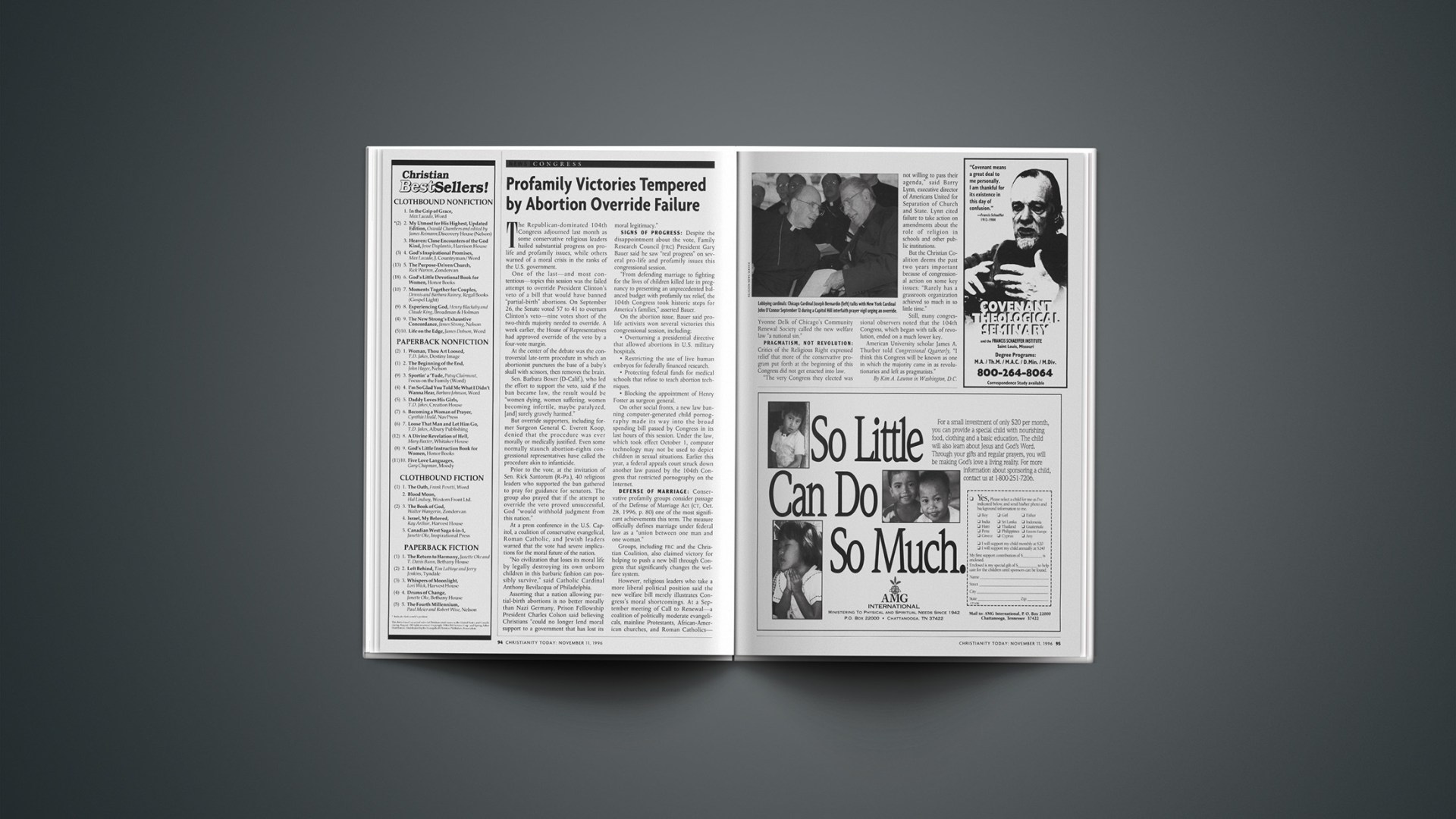The Republican-dominated 104th Congress adjourned last month as some conservative religious leaders hailed substantial progress on pro-life and profamily issues, while others warned of a moral crisis in the ranks of the U.S. government.
One of the last—and most contentious—topics this session was the failed attempt to override President Clinton’s veto of a bill that would have banned “partial-birth” abortions. On September 26, the Senate voted 57 to 41 to overturn Clinton’s veto—nine votes short of the two-thirds majority needed to override. A week earlier, the House of Representatives had approved override of the veto by a four-vote margin.
At the center of the debate was the controversial late-term procedure in which an abortionist punctures the base of a baby’s skull with scissors, then removes the brain.
Sen. Barbara Boxer (D-Calif.), who led the effort to support the veto, said if the ban became law, the result would be “women dying, women suffering, women becoming infertile, maybe paralyzed, [and] surely gravely harmed.”
But override supporters, including former Surgeon General C. Everett Koop, denied that the procedure was ever morally or medically justified. Even some normally staunch abortion-rights congressional representatives have called the procedure akin to infanticide.
Prior to the vote, at the invitation of Sen. Rick Santorum (R-Pa.), 40 religious leaders who supported the ban gathered to pray for guidance for senators. The group also prayed that if the attempt to override the veto proved unsuccessful, God “would withhold judgment from this nation.”
At a press conference in the U.S. Capitol, a coalition of conservative evangelical, Roman Catholic, and Jewish leaders warned that the vote had severe implications for the moral future of the nation.
“No civilization that loses its moral life by legally destroying its own unborn children in this barbaric fashion can possibly survive,” said Catholic Cardinal Anthony Bevilacqua of Philadelphia.
Asserting that a nation allowing partial-birth abortions is no better morally than Nazi Germany, Prison Fellowship President Charles Colson said believing Christians “could no longer lend moral support to a government that has lost its moral legitimacy.”
SIGNS OF PROGRESS: Despite the disappointment about the vote, Family Research Council (FRC) President Gary Bauer said he saw “real progress” on several pro-life and profamily issues this congressional session.
“From defending marriage to fighting for the lives of children killed late in pregnancy to presenting an unprecedented balanced budget with profamily tax relief, the 104th Congress took historic steps for America’s families,” asserted Bauer.
On the abortion issue, Bauer said pro-life activists won several victories this congressional session, including:
—Overturning a presidential directive that allowed abortions in U.S. military hospitals.
—Restricting the use of live human embryos for federally financed research.
—Protecting federal funds for medical schools that refuse to teach abortion techniques.
—Blocking the appointment of Henry Foster as surgeon general.
On other social fronts, a new law banning computer-generated child pornography made its way into the broad spending bill passed by Congress in its last hours of this session. Under the law, which took effect October 1, computer technology may not be used to depict children in sexual situations. Earlier this year, a federal appeals court struck down another law passed by the 104th Congress that restricted pornography on the Internet.
DEFENSE OF MARRIAGE: Conservative profamily groups consider passage of the Defense of Marriage Act (CT, Oct. 28, 1996, p. 80) one of the most significant achievements this term. The measure officially defines marriage under federal law as a “union between one man and one woman.”
Groups, including FRC and the Christian Coalition, also claimed victory for helping to push a new bill through Congress that significantly changes the welfare system.
However, religious leaders who take a more liberal political position said the new welfare bill merely illustrates Congress’s moral shortcomings. At a September meeting of Call to Renewal—a coalition of politically moderate evangelicals, mainline Protestants, African-American churches, and Roman Catholics—Yvonne Delk of Chicago’s Community Renewal Society called the new welfare law “a national sin.”
PRAGMATISM, NOT REVOLUTION: Critics of the Religious Right expressed relief that more of the conservative program put forth at the beginning of this Congress did not get enacted into law.
“The very Congress they elected was not willing to pass their agenda,” said Barry Lynn, executive director of Americans United for Separation of Church and State. Lynn cited failure to take action on amendments about the role of religion in schools and other public institutions.
But the Christian Coalition deems the past two years important because of congressional action on some key issues: “Rarely has a grassroots organization achieved so much in so little time.”
Still, many congressional observers noted that the 104th Congress, which began with talk of revolution, ended on a much lower key.
American University scholar James A. Thurber told Congressional Quarterly, “I think this Congress will be known as one in which the majority came in as revolutionaries and left as pragmatists.”
Copyright © 1996 Christianity Today. Click for reprint information.










